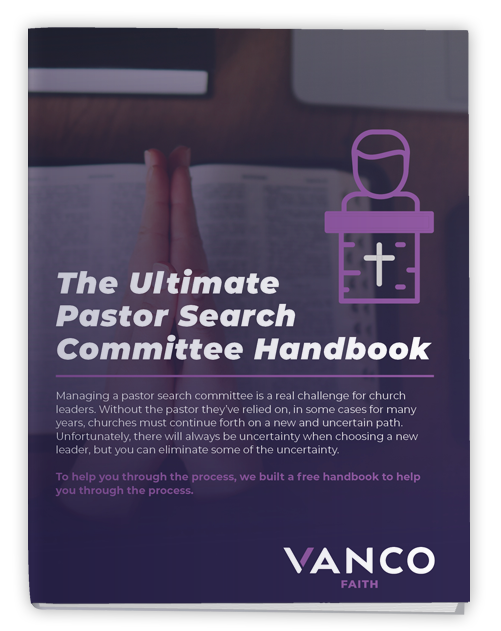
The perfect pastor interview questions will help you find your church's ideal spiritual leader.
When looking for a great pastoral candidate, first pray. Pray that you find the right person for your church, or that they find you. You want someone with great character, consciousness and a capacity for caring.
Our 50 critical questions for prospective pastors will help you find that person. The questions we have selected cover topics like Christian education, counseling, past experience, pastoral care and much more. There are many other questions church leaders can ask a prospective pastor; these are just a jumping-off point to help get you started.
Too Busy to Read? Listen to the Key Takeaways
Get the key takeaways by clicking to listen the podcast summary now!
Pastor Interview Questions About Christian Education
Christian education is vital for pastors. Pastors can pass their knowledge to their congregation, youth and community. It's important you know how potential candidates view this topic and how they will implement it throughout spiritual leadership practices in the church.
The following eight questions for pastor interviews will help you clearly understand how a candidate views education and their role in learning.
1. Do You Have Plans for Future Education?
The answer to this question can tell much about the person and their future goals. It may also show they are willing to work in a certain field, their education plans and what kind of lifestyle they want. It also gives insight into how committed they are to the pastoral profession.
2. How Do You Believe the Church Should Be Involved with Continuing Education?
This question can show how pastoral candidates think about the church and its involvement in continuing education.
Pastors should be aware of what's going on in their community and help people learn more about God, thus the need for continuing education.
3. Do You Encourage Participation in State and Associational Trainings? Why or Why Not?
This is one of the most popular and critical questions for prospective pastors. Most people assume pastoral candidates are active participants in any training given, but not always... so it’s good to ask. The answer to this question shows how much commitment the candidate has to their career.
4. What are the Most Valuable Skills You Bring to the Church and How Did You Obtain Them?
The answer to this two-part question will say a lot about the candidate's pastoral calling and qualifications. If they mention extensive experience with people, they will likely be a great fit for your congregation.
If they mention they have a professional background in another field, delve a little deeper. See what they’re good at. Those skills could also benefit your ministry.
5. Describe Your Present Model for Education in the Church.
Pastor interview questions about education models in the church give you a glimpse of how the candidate would approach pastoral work.
Their response will give you a good idea of whether they have meaningful and relevant experience in their field.
6. What Successful Approach Have You Found for Adult Education?
Adult education is an often overlooked topic in the church. It's important to ask pastoral candidates about their approach to adult education and how they have succeeded in this area.
There are many approaches to adult education in the church:
- Bible study groups
- Workshops
- Seminars
- Lectures
Learn about their approach and experience with these topics.
7. What is Your Role in Christian Education?
The answer to this question can give you a good idea of what role the candidate will play in your church. It also tells you a lot about their personality, which is important. Will this person integrate well with other personalities at your church?
The role of a pastor in Christian education is to create and support a community that allows for the development of an individual's faith. Pastors should be aware of their students' different spiritual, academic and social needs. They should be able to provide advice on these needs and help students find the best solutions. The answer to this question will allow you to recognize if the candidate is ready for the role.
8. What Educational Programs Do You Emphasize?
Pastoral candidates should be able to answer this question with confidence. It shows they have experience in the field or have done their research and thought about what they want out of their careers.
The answer says a lot about the person's personality. It also reveals how they would function in the workplace and highlights that they are self-motivated and are not afraid of hard work.
Pastor Interview Questions About Counseling
Counseling is an important aspect of a pastor's job. People of all ages have struggles that they talk to pastors about. How a candidate handles those situations will reveal how good of a fit they are for your church.
The candidates' answers to the following questions for pastor interviews will tell you how they would likely perform at your church.
9. What is Your Position on Pastoral Counseling?
Asking the candidate about pastoral counseling can help you get a sense of their mindset. You'll also gain insight into what they believe in and the work they do in the field.
Pastors are not required to complete pastoral counseling training, as it is not essential to pastoral ministry. However, it is important for pastors to understand how pastoral counseling works and what it means for their ministry.
Pastoral counseling can be helpful for pastors and the people they minister to. Pastors should be open-minded about this form of ministry. The best candidates will be willing to learn more about it from colleagues or books.
10. Do You Consider Yourself a Counselor?
Answering pastor interview questions like this can help you understand if the candidate has the characteristics you are looking for. Some pastoral candidates might not consider themselves counselors. Instead, they see themselves as spiritual leaders or ministers.
However, even candidates who are not trained in counseling may help people with their spiritual needs and provide them with advice on how to live a better spiritual life.
11. Describe Your Approach to Premarital Counseling
A candidate's approach to premarital counseling says a lot about them and their pastoral approach. If they are open to discussing uncomfortable topics, such as sex, divorce and intimacy, they may have some helpful insights into your congregation's needs. However, if they are unwilling to discuss these topics, it could mean this person isn't the best fit for your congregation.
Pastors should always be sensitive to their parishioners' needs. They should also be mindful that premarital counseling can be a difficult experience for some couples.
Church leaders should understand that premarital counseling is not just about finding out whether a couple will be happy or not. It also helps couples to understand each other better. It can identify their strengths, weaknesses and expectations of each other.
Pastor Interview Questions About Experience
Experience is an important topic during the pastor interview process. Pastors could have gained their experience in many ways. When interviewing a pastor, the following questions will help you get a deeper understanding of your candidate's past:
12. Describe Your Ideal Church Policy Structure
Knowing what a candidate wants out of a church policy structure is an important step. How they answer this question tells you a lot about how they worked in the past and how they expect the church to work and help others.
The answer tells you their church vision and mission, values, goals and what they seek in a church. It also gives you an idea of what kind of church they would be good at leading.
A good church policy should always include the following:
- A clear mission statement describing what the church is about
- A list of values that everyone who joins the church should agree with
- A list of policies to help guide members in their day-to-day lives
- A description of how the church meets its financial needs
- A formula for distributing money to members
- A list of contact details for people who might be interested in finding out more about joining
13. How Do You Describe a Successful Worship Service?
A successful worship service is one where the congregation feels connected to God, the pastor and each other. It's a place where people are encouraged to be open about their struggles and worship God with open hearts.
The candidate should know how to lead a congregation during a worship service. Their answers should show they appreciate people's needs and are excited about bringing God’s word to worship.
14. How Do You Make Changes in the Church?
It's important to ask candidates how they make changes in the church. This will show if they have the right skills and mindset for your needs.
Pastors have a lot of power. They can make changes in their churches and reach out to people in need. But these pastoral responsibilities come with many challenges.
Your candidate should have the foresight to deal with these challenges and implement changes that benefit the congregation.
15. What Style of Public Worship and Preaching Do You Prefer?
Pastoral candidates often prefer a particular style of public preaching and worship. You should ask what style of preaching and worship a candidate prefers. The answer gives you a better understanding of their personality and ministry strengths.
When asking this question, it is important to note that the answer should only indicate their preferences, not how they would lead the ministry.
16. What Have You Learned from Past Congregations to Make You a Better Pastor?
Pastoral candidates learn from their past experiences. They learn how to lead a church, communicate with different people and take care of a congregation. These are all important skills that pastoral candidates need to be effective pastors.
The answer to this question will help you understand what they have learned and show what they can offer their new congregation.
17. How Have You Approached Financial Stewardship Issues in Past Congregations?
Pastors are responsible for the finances of the church and should be able to answer this question with ease.
There are several ways to approach pastor interview questions like this. One way is to ask how the candidate handled financial matters in previous congregations. You can also ask how they have approached these issues in their personal lives.
18. How Do You Prepare Sermons?
The best candidates prepare their sermons in advance. They consider what the congregation would be most interested in hearing about. Many focus on ongoing or current events or issues and prepare sermons accordingly.
The answer to this question is a great way to get a sense of the person's personality and to gain insight into how they think and approach their work.
19. How Do You Prefer to Conduct Business Meetings?
The answer to this question reveals a lot about the person's personality, communication style and work ethic. You should take note of it and use it in your decision-making process.
The best way for pastors to conduct business meetings is by having clear goals and objectives in mind before the meeting begins. They should also prepare an agenda in advance that includes all the necessary items they want to cover. This will help them avoid unnecessary distractions and focus on what they need to do.
20. What Types of Staff Conflicts Have You Dealt with in the Past?
Pastoral candidates should be honest about their experiences and the conflicts they have learned from. They should also explain how these situations have helped them grow as a person and an employee. This will give you a better understanding of how they will work with their staff and what you can expect from them.
21. Have You Ever Had to Terminate a Church Staff Member?
Pastoral candidates should be honest with their answers and ready to handle tough situations and decisions that may arise in their work.
If they have terminated a staff member, ask for the details.
22. Can You Tell Us About Past Teaching, Counseling or Leadership Roles?
All these experiences provide insight into the candidate's skills and abilities. Personal life experiences can also impact pastoral leadership style in leadership roles.
Pastor Interview Questions About Pastoral Care
How a candidate views pastoral care is an important consideration. The following are critical questions for prospective pastors that give insight into those beliefs.
23. What Do You Like Most About the Ministry?
The answer to this question is not always so clear-cut. Some candidates might say they like being hands-on with people and helping them with their spiritual needs. Others might say they enjoy talking about God in a way that inspires people. There aren't really any wrong answers to this question.
However, the answer to this question will reveal a lot about the person. It can show their personality, values and approach to their work. The deeper they get with their answer, the more you know about your candidate. It will help you better decide whether they are right for the job.
24. What Do You Like Least About the Ministry?
It is important to ask this question early in the church leadership interview process so that you can find out if any red flags would make them a bad fit. This question helps you understand their personality and how they might respond to different situations. Like the “what do you like most” question, it also determines if they would be a good fit for your church.
25. What Tasks Are Most Important as a Pastor?
Candidates are often asked pastor interview questions like this, which are not always easy to answer. There are many different tasks required of pastors. And many candidates will say “all of them.” But that’s not the point of the question.
Pastors must be able to lead, teach, counsel and serve the people of their congregation. To do this effectively, they should understand what is most important for them to do in their role as pastors.
26. What Should the Core Values of Your Church Be?
When interviewing a pastoral candidate, you should ask them what they believe the core values of a church should be. This will help you get a better idea of their values and beliefs.
While many churches have similar core values, it is important to know which one the candidate would focus on.
27. What Role Does Pastoral Care and Counseling Play to a Pastor?
Pastoral care and counseling are vital parts of pastoral ministry. Pastors need the knowledge and skills to counsel their flock effectively. They are an essential part of a pastor’s role and should be emphasized in pastoral candidates.
Pastor roles are multifaceted and it's important that they know how to provide the best care. Pastoral care and counseling should not be limited to just spiritual healing, but should also address issues such as:
- Mental health
- Substance abuse
- Domestic violence
- Divorce
- Social issues
The answer to this question will help you determine whether a candidate is a good fit for your church.
28. What Duties are More Important than Pastoral Care?
A bit of a trick question, the candidate should answer that pastoral care is the most important responsibility. If they say pastoral care is not their top priority, they may not have the commitment or passion needed for this position.
29. What Duties are Less Important than Pastoral Care?
This question aims to determine if the candidate is willing to handle duties that are less important than pastoral care. After they answer, ask them how much attention they are prepared to devote to these tasks. A well-balanced approach is essential.
30. How Do You Equip Church Members to Care for Other Members?
The answer to this question reveals what the pastoral candidate thinks about his or her role in relation to membership management. It also reflects how they handle personal relationships within the church.
It reveals a pastoral candidate’s understanding of their role and ability to equip other members with skills and knowledge.
31. How Do You View Your Role in Visiting Members and Guests?
Visiting members and guests require special attention as they may become long-term congregation members. Pastors should go out of their way to make them feel welcome and may even determine ways to promote loyalty among visitors. The right candidate will understand their importance in a church setting.
32. Do You Think a Pastor Should Have an Unlisted Phone Number? Why or Why Not?
This question uncovers how candidates feel about their privacy. It can provide insight into their feelings, thoughts and beliefs and help us understand what they are looking for in a church.
Many people think it is important for pastors to have an unlisted phone number so they can avoid distracting calls or texts from both the public and members of their congregation. Others think having a public phone number makes the pastor more accessible, making it easier to reach out when they need pastoral care.
There is no right or wrong answer to this question. However, the response will give you valuable insight into their state of mind.
General Pastor Interview Questions
These general questions for pastor interviews provide insight into the candidate's beliefs, spiritual leadership style, personality and leadership style.
33. How Do You Respond to Criticism?
As public figures, pastors are prone to criticism and they should know how to respond to it. Mainly, it's important that they don't get mad. Rather, they should take a step back and determine if it is relevant and applicable. If they think the criticism may improve their service, they should consider integrating it in their approach.
Not all criticism is valid, but preachers should always acknowledge it to ensure chuch members feel heard.
Criticism can come from all sides, including other church leaders or members. However, knowing how candidates respond can be crucial. It explains how they will manage church relationships during services, discipleship and new pastor onboarding.
34. What Is the Most Important Thing to Do During Your First Year with a Church?
The first year of work is a critical time for a new pastor. The most important thing to do during this time is to get familiar with the church, its members and its mission. Their answer should show they are committed to the mission and how they will help it grow.
Additionally, the candidate should provide an answer that's specific to your church. For example, they may discuss pain points and the improvements they would make. This approach demonstrates that they are an asset to your community and they took the time to get to know the church's needs.
35. How Should the Church Engage in Mission Work?
This is one of those pastor interview questions that helps you get a sense of what the candidate thinks about the church's role in mission work. It also helps you understand how they would lead.
It is important to ask this question because it demonstrates the person has thought about how the church should engage in mission work. Some candidates may go into extensive detail, showing they have given deep thought to the matter, which is a good sign.
36. What are Your Strengths?
The answer to this question is important because it tells you how well the candidate will contribute in a team setting. You’ll get a better idea of the candidate’s skill set, how they can benefit the church and how well they will communicate with your congregation.
Pastors have a lot to offer in the church and beyond. They can preach, lead a congregation and provide spiritual guidance. Preachers can also build relationships with their community members.
Some of the most common strengths pastors might consider their strengths include:
- Empathy
- People skills
- Ability to build relationships
- Creativity
- Extensive knowledge of different religions
- Deep understanding of scripture
37. What Are Your Weaknesses?
This is a common question in pretty much every job interview and it’s no different here. It helps the candidate identify areas in which they can grow and develop. It also gives you an idea of how your candidate works and what he or she needs to do to grow and be more successful in this role.
38. What Is Your Leadership Style?
Pastoral leadership style is an important factor to consider during the church hiring process. It helps you understand how they will lead your team and handle certain situations.
There are many leadership styles pastors may apply. However, the candidate should demonstrate that their style is effective, productive and suits your church culture.
The best way to lead a church is to be a servant leader. A servant leader does not use their position to control others or make decisions for them. Instead, they use their position to serve the needs of those under them and help them reach their full potential. This leadership style also helps create an environment where people feel safe and encouraged in what they are doing.
39. What Measures Do You Have in Place for Accountability?
Accountability is a key component of pastoral ministry. Pastoral candidates must take personal accountability for their actions and decisions.
Pastoral candidates should be able to demonstrate they have a plan for transparency and accountability. They should also be able to show how their past experience will help them succeed in this role.
40. What Measures Should Be in Place for Staff Accountability?
Pastor interview questions like this allow churches to see what measures the candidate will implement for staff accountability. They determine whether the candidate has considered accountability measures and how they will address them.
It’s not just about them having a staff accountability plan. The congregation should also have an idea of what that plan looks like and what they can expect. Find out about other church staffing tips they might recommend.
41. What Responsibility Do You Feel the Church Has to Serve the Community?
This question allows the candidate to demonstrate their understanding of the church’s role in society. It also reveals how they view the church’s responsibility to the community, demonstrating whether they fit your church well. It helps you know if a candidate is willing to serve their community and what kind of contribution they are willing to make.
42. How Can the Church Best Support You and/or Your Family?
In an ideal situation, the candidate will answer this question in a manner that shows potential for a mutually fulfilling relationship. Their position should benefit themselves and their families. However, their expectations should not be excessive or overly demanding.
The answer to this question will also provide insight into their relationship with their family, which can reflect on their role as a pastor.
43. What Motivates You as a Pastor?
We know that pastoral candidates have several motivations for becoming pastors. Some are in it for the money, some for the glory and some because God called them to be pastors. The question of what motivates them will help you understand what they are looking for from the church.
For the most part, pastoral candidate motivations are broken down into three categories:
- Spiritual: It is about finding a church that has a deep understanding of spiritual matters and has a personal relationship with Jesus Christ
- Social: It is about finding an environment where they can make friends and build relationships with people who share their values
- Financial: It is about finding an environment where they are paid well and have opportunities to grow professionally
44. How Do You Cope with Stress?
Stress is a normal human experience, but it can be overwhelming and difficult to manage if you don't have the right coping skills. 56% of pastors say that stress is a primary reason why they have considered quitting the ministry. Pastor interview questions like this reveal how they deal with stress and how it affects their well-being.
This question will allow candidates to show their strengths and weaknesses in managing stress. It will also give you insights into how they would respond in high-pressure situations.
45. Who Are Your Spiritual Role Models?
Finding out who a person’s spiritual role model is can give you a better idea of how they will lead the congregation. Their role models may be anyone from Biblical characters to people they have worked with who can also double as pastoral references.
This question is also a great way to help you understand what their faith means to them, their values, what they believe in and how they think about spiritual leadership.
46. What Are Your Long-Term Career Goals?
Long-term career goals are important to consider for potential candidates. The answer gives candidates an opportunity to share their passions and motivations. They will also reveal what they want from their work.
The interviewee might want to use this opportunity to tell you about their long-term career goals. Their hopes and dreams for the future reveal a lot about who they are and how long they will stay with your church. It also gives you insight into what they think about ministry and what their future plans might be.
47. Is There Anything in Your Background Check You Want to Discuss?
If you are interviewing a pastoral candidate, you should ask them about their background. You should also listen carefully to what they have to say. If they have something they feel uncomfortable discussing with you or are stumbling through their answer, get some clarity. If something is hidden in their past, it may be time to move on from the interview process.
Pastor Interview Questions About Theological and Ethical Activities
Asking a pastoral candidate about theological and ethical practices is a must for churches. The following questions will give you insight into their ideologies:
48. Describe a Personal Experience That Shaped Your Personal Theology
Life experiences shape our personal theologies, both good and bad. Our religious upbringing and spiritual practices also influence our outlook. This question will help the candidate dig deeper into their beliefs.
It also helps you understand candidates on a deeper level. Knowing more about their ethics and theologies gives you a clearer understanding of how they will lead the church. The answer to this question can also help them determine whether they would be a good fit for their position.
49. To What Degree Do You Differ from the Historical Doctrinal Positions of This Church?
The question will help you learn whether the candidate has doctrinal alignment with your church's history and theology. Ideally, you want someone who backs your historical doctrines and may even be able to bring something new to the table.
50. Describe Several Ethical Principles That Guide Your Work
This question ensures the pastoral candidate understands the moral and ethical implications of their work. It also helps you decide whether they are a good congregational fit.
Asking how they would approach a particular situation helps you learn more about the person's personality and understand how they will react in certain situations. The following are a few ethical examples to look for:
- Respect for others and for the environment
- Integrity in relationships
- Responsibility over power
- Equality and justice
Conclusion
Pastors play an important role in the church's growth and unity. It's essential to find one that's right for your church. Strategic pastor interview questions can help you achieve your goal.
The questions in this article can guide your interview process with recommendations that cover various aspects of the candidate's personality and beliefs. Hopefully, they will inspire your interview process. Good luck finding the best leaders for your congregation.
FAQs
How many interviews should a pastoral candidate go through?
A pastoral candidate typically goes through three to five meetings before a pulpit committee welcomes them to the congregation. The first is an initial screening to determine if they are a good fit. If they make it through the first round, they may have subsequent meetings with the pastoral search committee and various groups within the congregation. It will vary depending on the structure of your church and how many people are involved in the decision-making process.
Best practices dictate that you should send candidates forms, messages and letters to let them know where they are at in the application process. If you are unsure what to say, take inspiration from the linked articles or use AI prompts to get started.
Which red flags suggest a poor candidate fit?
Various red flags can indicate a poor fit during the interview process. For example, you may not want to move forward if:
- The candidate's values don't align with the church's values
- The candidate exhibits a lack of professionalism, such as unresponsiveness or showing up late
- If they show signs of inflexibility in conforming to the church's value system
- Any hint of a criminal record or inappropriate behavior
When should we discuss compensation and benefits?
It's never too early to discuss compensation and benefits. After all, if a pastor doesn't fit your budget, it's best to find out sooner rather than later. However, it's unwise to offer a definite figure until you are ready to hire. That way, you can base your wage determination on the candidate's skill and how much they will bring to the church.
Looking for Free Materials and Guides for Your Pastor Search Committee?
Hiring a new pastor is a big decision and it isn't easy. That's why we built a free kit complete with...
- 49 sample pastor interview questions for your interviews.
- Pastor search committee sample letters to communicate with candidates and references.
- Sample form of an authorization of records to conduct a background check.
- Sermon evaluation form sample for pastoral finalists.
- Sample survey questions for your congregation to identify the characteristics most important to them in a future pastor.
- A pastor search committee handbook to guide you through the process of choosing a new pastor.











